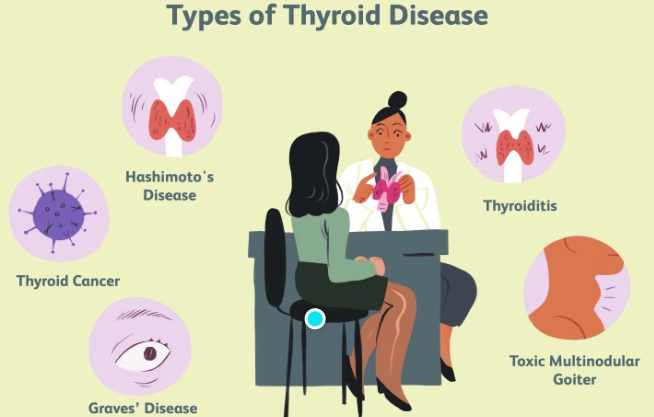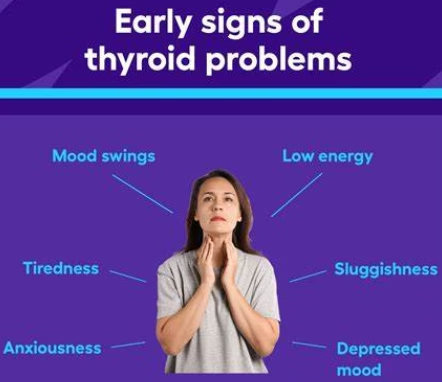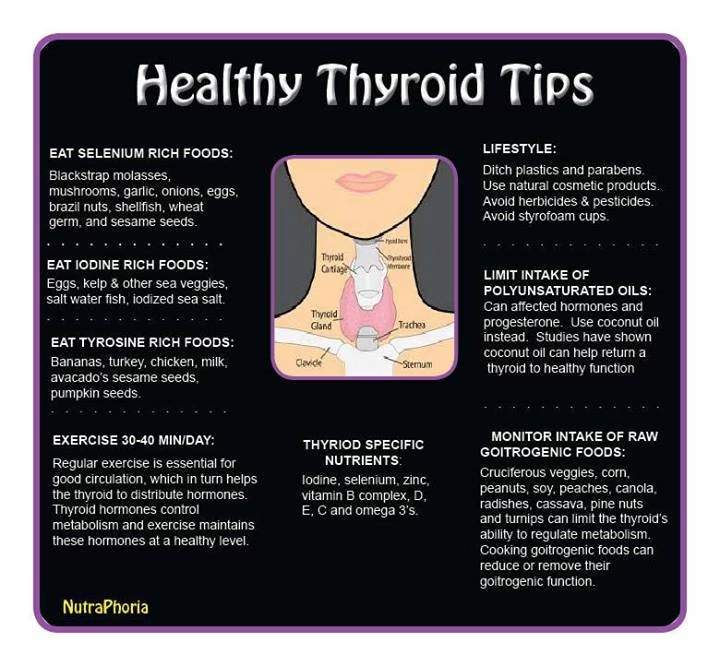Understanding Thyroid Conditions and Disorders: Recognizing Symptoms, Exploring Treatments, and Nurturing Thyroid Health
What conditions and disorders affect the thyroid?

There are several different types of thyroid disease, which is very common. An estimated 20 million people in the United States are affected by some form of thyroid disorder. Women and individuals assigned female at birth (AFAB) are about five to eight times more likely to be diagnosed with a thyroid condition than men and individuals assigned male at birth (AMAB).
Thyroid diseases are categorized into two types: primary and secondary.
In primary thyroid disease, the issue originates in the thyroid gland itself. For example, if a nodule on your thyroid produces excess thyroid hormones, this condition is called primary hyperthyroidism.
In secondary thyroid disease, the problem starts in the pituitary gland. For instance, if a tumor in the pituitary gland produces excess thyroid-stimulating hormone (TSH), which then stimulates the thyroid to produce an excess of thyroid hormones, this condition is referred to as secondary hyperthyroidism.
The four main conditions that affect your thyroid include:
- Hypothyroidism (underactive thyroid).
- Hyperthyroidism (overactive thyroid).
- Goiter (enlarged thyroid).
- Thyroid cancer.
Hypothyroidism
Hypothyroidism, an underactive thyroid, occurs when the thyroid gland fails to produce and release enough thyroid hormones. This deficiency can slow various metabolic processes in the body. It is a relatively common condition, affecting around 10 million people in the United States. Fortunately, it is treatable.
Causes of hypothyroidism include:
- Hashimoto’s disease, an autoimmune disease.
- Thyroiditis (inflammation of the thyroid).
- Iodine deficiency.
- A nonfunctioning thyroid gland (when the thyroid doesn’t work correctly from birth).
- Over-treatment of hyperthyroidism through medication.
- Thyroid gland removal.
Hyperthyroidism
Hyperthyroidism, an overactive thyroid, occurs when the thyroid gland produces and releases more hormones than the body requires. This excess of hormones can accelerate various metabolic processes. In the United States, about 1 in 100 people over the age of 12 are affected by hyperthyroidism. Fortunately, it is a treatable condition.
Causes of hyperthyroidism include:
- Graves’ disease, an autoimmune condition.
- Thyroid nodules.
- Thyroiditis (inflammation of the thyroid).
- Postpartum thyroiditis (inflammation of the thyroid that happens after giving birth).
- Excess iodine in your blood from diet and/or medication.
- Over-treatment of hypothyroidism through medication.
- A benign (noncancerous) tumor in your pituitary gland.
How to identify the difference between Hyperthyroidism and Hypothyroidism: Hypothyroidism vs. Hyperthyroidism: What’s the Difference?
Goiter
Goiter is the enlargement of the thyroid gland. Goiters are relatively common, affecting approximately 5% of people in the United States.
Goiters have different causes, depending on their type.
- Simple goiters: Goiters form when the thyroid gland fails to produce enough hormones for the body’s needs. In response, the thyroid enlarges to compensate for this deficiency..
- Endemic goiters: Goiters develop in individuals who do not consume enough iodine in their diet, as iodine is essential for the production of thyroid hormones. In the United States and several other countries, iodine is added to table salt, which means that people in those regions typically do not experience endemic goiters.
- Sporadic goiters: In most cases, the cause of these goiters is unknown. However, certain medications, such as lithium, can occasionally lead to goiters..
Thyroid cancer
Thyroid cancer is a type of cancer that starts in the tissues of the thyroid gland. Each year, approximately 53,000 people in the United States are diagnosed with thyroid cancer. Fortunately, treatments for most forms of thyroid cancer are highly effective.
Thyroid cancer is categorized based on the specific type of cells from which the cancer develops. The main types of thyroid cancer include:
- Papillary: Up to 80% of all thyroid cancer cases are papillary.
- Follicular: Follicular thyroid cancer accounts for up to 15% of thyroid cancer diagnoses.
- Medullary: About 2% of thyroid cancer cases are medullary. It’s often caused by a gene mutation.
- Anaplastic: About 2% of thyroid cancer cases are anaplastic.
What are the early warning signs and symptoms of thyroid problems?

Different thyroid conditions can present various symptoms. Since the thyroid plays a significant role in important body systems and processes, such as heart rate, metabolism, and temperature regulation, it is essential to be aware of certain signs that may indicate a thyroid issue. These symptoms include:
- Slow or rapid heart rate
- Unexplained weight loss or gain
- Difficulty tolerating cold or heat
- Depression or anxiety
- Irregular menstrual periods
If you’re experiencing any of these symptoms, it’s important to discuss them with your healthcare provider and consider getting a blood test to assess your thyroid function..
What are standard tests to check the health of the thyroid?

The first test used to evaluate the health of your thyroid is a blood test that measures the levels of thyroid-stimulating hormone (TSH). This screening test is useful for detecting both hypothyroidism and hyperthyroidism.
In general, the normal range for TSH levels is between 0.5 and 5.0 mIU/L (milli-international units per liter). However, this range can vary depending on the laboratory and certain factors such as pregnancy and age.
Your healthcare provider may also check the levels of T4 and T3, which are thyroid hormones, in your blood.
If your test results are abnormal, your provider may recommend additional imaging tests, such as a thyroid scan. This scan uses a small amount of safe radioactive material to produce images of your thyroid. Alternatively, they may suggest a thyroid ultrasound.
How are thyroid conditions treated?
There are several treatment options for thyroid conditions, depending on their specific type and severity. The three main treatment options include:
- Medication.
- Surgery.
- Radiation therapy and chemotherapy.
Medications for thyroid conditions include:
- Antithyroid Medications: These medications inhibit the thyroid’s ability to produce hormones and are commonly prescribed for hyperthyroidism.
- Beta-blockers: These medications help manage symptoms associated with hyperthyroidism, such as rapid heartbeat. However, they do not address the underlying thyroid condition.
- Radioactive Iodine: This treatment involves using radioactive iodine to damage thyroid cells, ultimately leading to the destruction of the thyroid gland. It is often used for hyperthyroidism and thyroid cancer.
- Thyroid Hormone Medications: These medications are synthetic forms of thyroid hormones used to treat hypothyroidism. Individuals who have undergone a thyroidectomy or have a nonfunctioning thyroid due to radioactive iodine treatment typically need to take these medications for the rest of their lives.
Surgery
The most prevalent surgical intervention associated with thyroid conditions is known as thyroidectomy. A thyroidectomy encompasses the complete surgical removal of the thyroid gland. This procedure is a primary treatment option for thyroid-related diseases and serves as the first-line approach for managing thyroid cancer.
An alternative surgical option is a lobectomy, which entails the removal of a specific portion of the thyroid gland.
Radiation therapy and chemotherapy
Radiation therapy and chemotherapy are viable treatment options for thyroid cancer. Both modalities are designed to target cancer cells, inhibiting their proliferation. However, it is important to note that the majority of thyroid cancer cases do not necessitate the use of radiation or chemotherapy.
What are the risk factors for developing a thyroid condition?
Thyroid conditions are quite prevalent and can affect individuals of all ages. Certain factors can increase the likelihood of developing a thyroid condition. These include:
- A family history of thyroid disease, which may indicate a genetic predisposition.
- The presence of an autoimmune condition, such as Type 1 diabetes, rheumatoid arthritis, or lupus, which can heighten the risk.
- The use of medications that are rich in iodine, which may impact thyroid function.
- Being over the age of 60, particularly among women and those assigned female at birth (AFAB), as age can be a contributing factor.
Awareness of these risk factors can help in monitoring and managing thyroid health effectively.
How can I keep my thyroid healthy?

Maintaining a healthy thyroid is crucial for overall well-being, and one of the key factors in ensuring proper thyroid function is adequate iodine intake. Iodine is an essential trace element that plays a vital role in the synthesis of thyroid hormones, which are responsible for regulating metabolism, growth, and development in the body.
The good news is that most individuals can obtain sufficient iodine through their diets. A primary source of dietary iodine is iodized table salt, which has been fortified with iodine to help prevent deficiencies. In addition to iodized salt, various foods are naturally rich in iodine or fortified with it, such as seafood, dairy products, eggs, and certain breads and cereals.
By including these iodine-rich foods in your diet, you can help ensure your thyroid has the necessary nutrients to function optimally, thereby supporting your overall health. It’s important to monitor your iodine intake, particularly if you follow a restricted diet, as both insufficient and excessive iodine can lead to thyroid dysfunction..
Other food sources that contain iodine include:
- Cheese.
- Cow’s milk.
- Eggs.
- Yogurt.
- Saltwater fish.
- Shellfish.
- Seaweed.
- Soy milk.
- Soy sauce.
While iodine is an essential nutrient for thyroid health, it is crucial to be mindful of the amount consumed, as excessive intake can lead to health issues. If you have questions or concerns regarding your thyroid function, it is advisable to consult your healthcare provider for personalized guidance.
When should I call my doctor about my thyroid?
If you are experiencing symptoms of thyroid disease, such as changes in weight, heart rate, or temperature sensitivity, it’s essential to contact your healthcare provider. They can conduct a simple blood test to determine if your thyroid is responsible for your symptoms.
A note from Slim180 Weight Loss Centers:
Your thyroid is a crucial gland in your endocrine system that affects many aspects of your body. Thyroid disease is prevalent and treatable. If you experience any thyroid disease-related symptoms or want to know if you have any risk factors for developing thyroid disease, don’t be afraid to talk to your healthcare provider. They’re there to help you.
